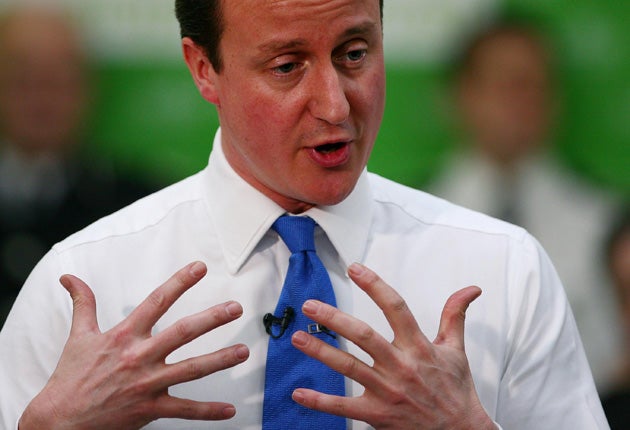Tories plan high speed internet

Your support helps us to tell the story
From reproductive rights to climate change to Big Tech, The Independent is on the ground when the story is developing. Whether it's investigating the financials of Elon Musk's pro-Trump PAC or producing our latest documentary, 'The A Word', which shines a light on the American women fighting for reproductive rights, we know how important it is to parse out the facts from the messaging.
At such a critical moment in US history, we need reporters on the ground. Your donation allows us to keep sending journalists to speak to both sides of the story.
The Independent is trusted by Americans across the entire political spectrum. And unlike many other quality news outlets, we choose not to lock Americans out of our reporting and analysis with paywalls. We believe quality journalism should be available to everyone, paid for by those who can afford it.
Your support makes all the difference.The Tories yesterday outlined plans to deliver "superfast" broadband to the majority of Britain's homes by 2017.
Using "market-based solutions" the party believe the UK can be the first major European country to have speeds of "up to" 100 mega bits per second (Mbps).
Changes to the regulatory framework and allowing private investors to pay for better cabling would encourage competition.
If the market does not deliver, then 3.5 per cent of the licence fee currently used to pay for digital switchover could be diverted to pay for broadband expansion.
But Labour accused the Tories of "playing catch-up", having opposed the Government's own plans to roll out broadband.
Shadow chancellor George Osborne today set out his party's proposals in an interview with the BBC's Andrew Marr Show.
He said: "In the 19th Century we built the railways. In the 20th Century we built the motorways.
"In the 21st Century let's build the super-fast broadband network that will create hundreds of thousands of jobs for Britain."
The Tories say they will end BT's "local loop monopoly" and allow other operators to move in with their own ducts and fibre cables, an approach that has proved successful in countries such as Singapore and South Korea.
Their policy would lead to "significantly faster" broadband than the Government's commitment of a universal service commitment of 2Mbps by 2012.
Shadow culture, media and sport secretary Jeremy Hunt said: "We are currently one of the slowest countries in the developed world for broadband.
"With the Conservatives we'll become one of the fastest. High speeds will be available not just in our cities but across the rural areas that have been left behind for too long.
"These regulatory changes will create the right conditions for sustainable growth and ensure that the digital sector plays a leading role in a competitive, balanced economy."
But Financial Secretary to the Treasury Stephen Timms said: "On broadband it's not Britain but the Tories that are playing catch-up.
"Labour have already announced measures for rolling out broadband across the country - and the Tories have opposed the plans to make that happen."
Join our commenting forum
Join thought-provoking conversations, follow other Independent readers and see their replies
Comments